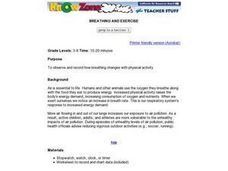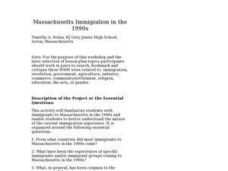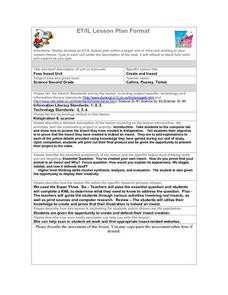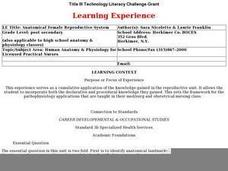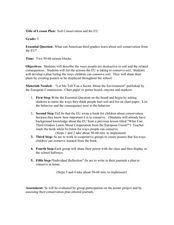Alabama Learning Exchange
The Very Hungry Class
Students listen to a read aloud of Eric Carle's, The Very Hungry Caterpillar, as an introduction to their study of the metamorphosis of a butterfly. They participate in a number of cross-curricular activities in this unit of lessons.
Curated OER
Darwin, Politics, and Religion
High schoolers gain an understanding of the Darwinian theory of evolution, examine how Darwin's theory has been adopted by ruling elites in order to justify their position in power, compare religious and historical responses to Darwin's...
Curated OER
Watching Crystals Grow
Pupils observe crystal growth of Epsom salts and the variables that hinder or help their nucleation and growth. They illustrate a series of drawings/pictures as the crystals grow. They look for the different shapes they form as well as...
Curated OER
Breathing Rates and Exercise
Learners work in groups to predict which condition produces more breaths per minute. Groups record their breathing rates during rest periods and periods of activity. They graph their results and make comparisons to their predictions.
Curated OER
Blend-A-Plant Levels of Organization
Students' identify and analyze the levels of organization and the emergent properties through experimentation. Students' apply the differences in the properties of a plant before and after it has been subjected to a kitchen blender.
Curated OER
Researching Plant Life
Fourth graders examine the process of photosynthesis. Given websites about plant life, 4th graders retrieve and record accurate information about the parts of the plant and photosynthesis. Students solve a "Plant Life Mystery" from...
Curated OER
Breathing and Exercise
Pupils observe and record how breathing changes with physical activities. In this physical activity lesson students form groups and complete their activity and worksheets.
Curated OER
Wetland Habitats
Eighth graders explore the program Alice and the Internet to research wetland habitats. In this habitat lesson students build their own Alice world that includes wetland habitats, food sources and ways to protect the habitats.
Curated OER
The Lesson: Space Exploration
Learners explore space. In this current events lesson, students visit selected websites to learn about NASA, Mars, the Seti Institute, and space exploration terminology. Learners make space glossaries and their own telescopes.
Curated OER
Social Studies: Analyzing Massachusetts Immigration
Students investigate immigration in Massachusetts during the 1990's. They research a series of questions pertaining to immigration, including their experiences, obstacles, and countries of origin. They graph the five most prevalent...
Curated OER
Engaging Young Scientists with Inquiry: Part Two
Evaluating data and learning to communicate the results is a big piece of the inquiry puzzle.
Curated OER
Notes on Cell Organelles
Students record information and write journal entries on the structure and function of cell organelles while viewing a Powerpoint presentation.
Curated OER
Insect Unit
Second graders use technology to investigate the concept of an insect. They use Kidspiration in order to create an insect. Then research is conducted to match the picture with the correct insect. Then students write a report about the...
Curated OER
Where's the Evidence?
Eighth graders observe evidence of chemical reactions. In this chemical reactions lesson students study chemical processes and complete a lab activity.
Curated OER
What's Up with Waste?
Fifth graders design a brochure that identifies types of solid waste that are often improperly disposed, explains the effects of this disposal and proposes a solution to the problem. The read humorous books, define vocabulary words and...
Curated OER
Biodiversity: El Imposible National Park, El Salvador
Fifth graders explore the concept of how the more diverse an ecosystem is, the more interdependence of species exists within that system. The complex relationships among diverse species are difficult to identify. As species disappear or...
Curated OER
The Periodic Table
Eleventh graders examine the history and development of the periodic table and properties of elements. They complete worksheets, take notes during a teacher-led discussion, and produce their own periodic table.
Curated OER
What is the Problem of Boston Harbor?
Pupils recognize the affects of technology on the environment. They examine data to determine methods to improve waater quality. A research paper is written to desribe recommendations for improving water in the future.
Curated OER
Anatomical Female Reproductive System
Students dissect internal female reproductive organs and take digital pictures that are exported onto a disc for use with power point technology.
Curated OER
Biodiversity
Students are challenged to examine the diversity of their own forest and make comparisons to a tropical rainforest. By exploring and grouping tree and insect types in their local forest, students will develop an understanding of diversity.
Curated OER
What can American third graders learn about soil from the European Union
Third graders develop a list of ways humans destroy soil. In this soil conservation lesson, 3rd graders listen to a book on soil conservation and design posters about how to conserve soil. Students share their work orally with classmates...
Curated OER
Amphibian Features - Frog Dissection
Seventh graders examine the physical features of an amphibian. In this investigative lesson students compare and contrast the anatomy of a frog to a human.
Curated OER
Classifying Organisms within Kingdoms
Students examine animal kingdom classifications. They discuss how animals are placed into kingdom classifications and compare similarities and differences of animals within a kingdom.
Curated OER
Life on a Farm
Students take a field trip to a farm or observe pictures of farms and animals in the classroom. They paint a mural of a farm setting with animals. They practice phonetic skills with farm stories and songs. They explain how milk becomes...





